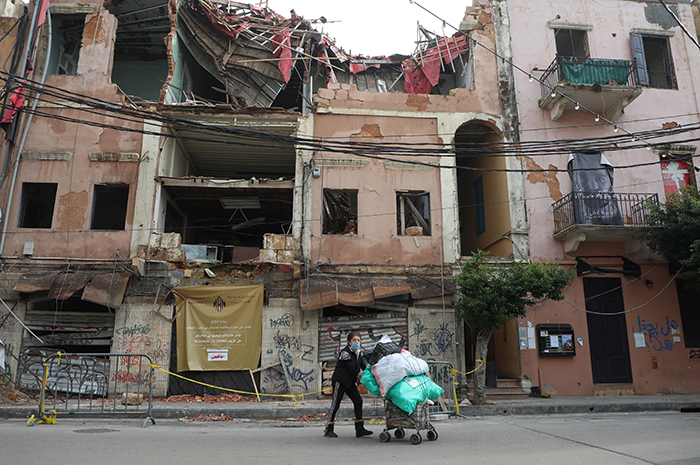
WINDSOR TERRACE — The damage sustained by St. Joseph Church from the August 4, 2020, Beirut port explosion has been repaired. But repairing parishioners’ frazzled nerves will take a lot longer.
“The situation is really very bad,” said Father Gabriel Khairallah, the church’s rector. “The country’s collapsing on the social side and on the financial side. People are feeling desperate.”
[Related:Nearly a Year After Beirut Blast: ‘We are Bleeding, Help is Needed’]
One year after the devastating blast, Beirut is experiencing shortages of food, gasoline, and medicine as a result of three factors: the aftermath of the explosion, the collapse of the Lebanese government, and the COVID pandemic, according to people on the ground.
Inflation is high, causing everyday items to be priced out of reach for average citizens.
“Something that used to cost $1,500 now costs $22,000,” Father Khairallah said. “People are buying food on the black market. Most people have no gasoline and, in some places, electricity is on for only short periods.”
Local Catholic clergy will mark the anniversary of the disaster with a special Mass at the port beginning at 6:07 p.m. Beirut time, the moment the blast took place.
The powerful blast destroyed large sections of neighborhoods, killed more than 200 people, injured more than 6,000, and caused an estimated $15 billion in damage.
A subsequent investigation attributed the explosion to 2,700 tons of ammonium nitrate stored at the government-owned port.
The international community has provided billions of dollars in aid to help Lebanon recover. Religious organizations like Caritas Lebanon, the St. Vincent de Paul Society, the Catholic Near East Welfare Association (CNEWA), and Aid to the Church in Need (ACN) have stepped up to help.
Today, a year after the terrible port explosion in the capital Beirut, I appeal to the international community to offer #Lebanon concrete assistance in undertaking a journey of “resurrection”, so that Lebanon may once more be a message of peace and fraternity.
— Pope Francis (@Pontifex) August 4, 2021
“It’s been the Catholic institutions of Lebanon that have served the Christian and Muslim populations equally that are the most active but yet the most vulnerable right now. They are overwhelmed. So we’re trying to save them,” said Bishop Gregory Mansour, leader of the Eparchy of St. Maron of Brooklyn. The borough is home to many Lebanese Catholics.
The eparchy has worked with the St. Vincent de Paul Society and religious women on the ground. Bishop Mansour, who has visited Beirut, also spoke to members of the U.S. Congress about the situation during the recent International Religious Freedom Summit in Washington D.C.
Locally, the Diocese of Brooklyn raised $91,000 and the Knights of Columbus donated $250,000 to help the Lebanese.
Shortly after the explosion, the Vatican’s Congregation for Eastern Churches tapped CNEWA and L’Oeuvre d’Orient, a Paris-based group, to coordinate worldwide Catholic aid to Lebanon.
CNEWA concentrated on repairing damaged Catholic hospitals, including Lebanese Hospital Geitaoui, located a half-mile from the port. L’Oeuvre d’Orient’s efforts were focused on repairing Catholic schools.
St. Joseph Church, a 150-year-old Jesuit institution, is located less than two miles from the blast site. The explosion blew out the windows and doors and damaged the building’s roof and lighting fixtures. The church was repaired with help from Aid to the Church in Need.
The repairs were a priority, said Edward Clancy, the organization’s director of outreach.
“There’s no faith in the (Lebanese) government. So there’s no sense that the government is going to do anything, for example, with the buildings that have been destroyed or damaged. But we know that churches are the center of community life,” he said.
ACN does not have an office in Beirut but works with local churches and with organizations like CNEWA, which has people on the ground.
“Our first efforts were food relief, and then housing,” Clancy said. More than 300,000 people were displaced by the explosion, according to estimates.
With its building repaired, St. Joseph Church is doing what it can to provide assistance to people in need. Volunteers operate a food pantry, distributing basics like cereal and tuna, and parishioners have stepped forward to cook meals for poverty-stricken families. Father Khairallah has secured medications for parishioners with chronic conditions such as heart disease and diabetes.
“We are not without hope,” Father Khairallah said. “I tell my parishioners, ‘The country is broken, but you are not broken.’ ”
Bishop Mansour said he is heartened by the response, both internationally and locally.
“I spoke to a man who is in Lebanon. He brought 11 different containers of supplies with him. He’s a doctor, so he’s helping the Franciscan Sisters to assist the poor. That’s just one of 100 stories about people rolling up their sleeves and helping,” the bishop said.
